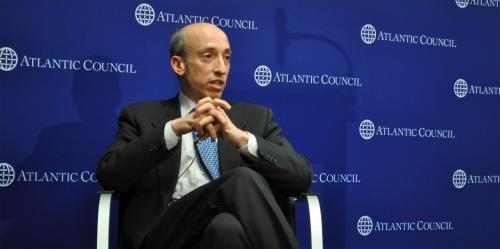
The nation’s chief commodities regulator told the Atlantic Council that, "A healthy financial future requires that we bring comprehensive reform to the over-the-counter derivatives markets. It is critically important that we bring transparency to this market and address the significant information advantage enjoyed by Wall Street."
Gary Gensler, chairman of the Commodity Futures Trading Commission, delivered that call to action as part of the Council’s Mapping the Economic and Financial Future series, which he deemed "of utmost importance" during a "crisis where both the financial system and the financial regulatory system failed the American public." He noted that, "In the aftermath of the last great financial crisis, President Franklin Roosevelt worked with Congress in the 1930s to bring regulation to the futures and securities markets. Futures and securities were not only regulated against fraud and manipulation, but also were regulated to ensure transparency and competition in the marketplace."
In Gensler’s estimation, these regulations created enormous benefit but have not kept pace with the changes in the financial system, leading to an "opaque market, concentrated with a small number of financial institutions," which "contributed to a financial system brought to the brink of collapse." He’s especially concerned with the over-the-counter derivatives market, which he said "began in 1981 and remain to this day largely unregulated." This is significant because these commodities have "balloon[ed] to approximately $300 trillion in notional value in the United States – that’s nearly 20 times the size of the American economy."
The problem is that, "Wall Street retains the information advantage. When a Wall Street bank enters into a bilateral derivative transaction with a customer, the bank knows how much its last customer paid for similar transactions, but that information is not generally made available to other customers or the public." Gensler asserted that, "We would not tolerate it if other markets operated similarly to over-the-counter derivatives, where dealers are the only ones with much of the relevant information. It would be like buying an apple from the supermarket when the price of the apple is kept private."
If Gensler were to get his way, "all transactions in standard contracts" would "be required to be conducted on regulated trading facilities or exchanges."
The House passed a bill on December 11 that would increase transparency somewhat but that does not, in Gensler’s view, go far enough. He charges that lobbyists from the Chamber of Commerce and the National Association of Manufacturers managed to keep end-user exemption. He proclaimed, "Corporate America is on one side of the debate, I’m on the other." But he also proclaimed that "It is the Wall Street banks that benefit from the so- called end-user exemption from transparency, not the businesses that use derivatives," which would seem to indicate that he has a different idea of what’s good for business than the people who run said businesses.
This is a situation where the American public has no position on the issue — indeed, the vast majority have no idea there even is an issue — and in which the interested parties will therefore dominate the debate. Given the way our system works, it appears Corporate America will get their way, at least for now. They’ve moderated the House bill and it’s virtually inconceivable that the Senate will move it further in Gensler’s preferred direction.
James Joyner is managing editor of the Atlantic Council.
Image: gary-gensler-atlantic-council.jpg
